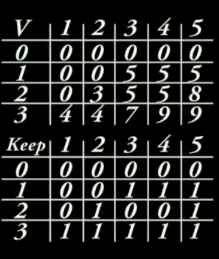Khi làm bài tập Lập trình mạng, tớ có nhu cầu ghi nội dung của một luồng RSS thành tập tin XML. Làm thử theo bài hướng dẫn trên trang của Sun thì tập tin ghi ra bị lỗi, các ký tự Unicode không đọc được. Google một hồi thì ra hướng dẫn này.
When I was coding for my Network Programming's coursework, I faced a common problem in Java: writing a file. Following the tutorial on Sun's website, what I got is a file with wrong encoding. All Unicode characters were missed. After googling for a while, I found this useful snippet, thanks to Trip over IT.
Tạo tập tin UnicodeUtils.java
First, create a file named UnicodeUtils.java.
import java.io.BufferedReader;
import java.io.BufferedWriter;
import java.io.ByteArrayInputStream;
import java.io.ByteArrayOutputStream;
import java.io.IOException;
import java.io.InputStream;
import java.io.InputStreamReader;
import java.io.OutputStreamWriter;
import java.io.PushbackInputStream;
import java.io.UnsupportedEncodingException;
import java.io.Writer;
public class UnicodeUtil {
public static byte[] convert(byte[] bytes, String encout) throws Exception {
// Workaround for bug that will not be fixed by SUN
// http://bugs.sun.com/bugdatabase/view_bug.do?bug_id=4508058
UnicodeInputStream uis = new UnicodeInputStream(new ByteArrayInputStream(bytes), "ASCII");
boolean unicodeOutputReqd = (getBOM(encout) != null) ? true : false;
String enc = uis.getEncoding();
String BOM = getBOM(enc); // get the BOM of the inputstream
if (BOM == null) {
// inputstream looks like ascii...
// create a BOM based on the outputstream
BOM = getBOM(encout);
}
uis.close();
ByteArrayOutputStream out = new ByteArrayOutputStream();
BufferedReader br = new BufferedReader(new InputStreamReader(new ByteArrayInputStream(bytes, uis.getBOMOffset(), bytes.length), enc));
Writer w = new BufferedWriter(new OutputStreamWriter(out, encout));
// dont write a BOM for ascii(out) as the OutputStreamWriter
// will not process it correctly.
if (BOM != null && unicodeOutputReqd) {
w.write(BOM);
}
char[] buffer = new char[4096];
int len;
while ((len = br.read(buffer)) != -1) {
w.write(buffer, 0, len);
}
br.close(); // Close the input.
w.close(); // Flush and close output.
return out.toByteArray();
}
public static String getBOM(String enc) throws UnsupportedEncodingException {
if ("UTF-8".equals(enc)) {
byte[] bom = new byte[3];
bom[0] = (byte) 0xEF;
bom[1] = (byte) 0xBB;
bom[2] = (byte) 0xBF;
return new String(bom, enc);
} else if ("UTF-16BE".equals(enc)) {
byte[] bom = new byte[2];
bom[0] = (byte) 0xFE;
bom[1] = (byte) 0xFF;
return new String(bom, enc);
} else if ("UTF-16LE".equals(enc)) {
byte[] bom = new byte[2];
bom[0] = (byte) 0xFF;
bom[1] = (byte) 0xFE;
return new String(bom, enc);
} else if ("UTF-32BE".equals(enc)) {
byte[] bom = new byte[4];
bom[0] = (byte) 0x00;
bom[1] = (byte) 0x00;
bom[2] = (byte) 0xFE;
bom[3] = (byte) 0xFF;
return new String(bom, enc);
} else if ("UTF-32LE".equals(enc)) {
byte[] bom = new byte[4];
bom[0] = (byte) 0x00;
bom[1] = (byte) 0x00;
bom[2] = (byte) 0xFF;
bom[3] = (byte) 0xFE;
return new String(bom, enc);
} else {
return null;
}
}
public static class UnicodeInputStream extends InputStream {
private PushbackInputStream internalIn;
private boolean isInited = false;
private int BOMOffset = -1;
private String defaultEnc;
private String encoding;
public static final int BOM_SIZE = 4;
public UnicodeInputStream(InputStream in, String defaultEnc) {
internalIn = new PushbackInputStream(in, BOM_SIZE);
this.defaultEnc = defaultEnc;
}
public String getDefaultEncoding() {
return defaultEnc;
}
public String getEncoding() {
if (!isInited) {
try {
init();
} catch (IOException ex) {
IllegalStateException ise = new IllegalStateException("Init method failed.");
ise.initCause(ise);
throw ise;
}
}
return encoding;
}
/**
* Read-ahead four bytes and check for BOM marks. Extra bytes are unread
* back to the stream, only BOM bytes are skipped.
*/
protected void init() throws IOException {
if (isInited)
return;
byte bom[] = new byte[BOM_SIZE];
int n, unread;
n = internalIn.read(bom, 0, bom.length);
if ((bom[0] == (byte) 0x00) && (bom[1] == (byte) 0x00) && (bom[2] == (byte) 0xFE) && (bom[3] == (byte) 0xFF)) {
encoding = "UTF-32BE";
unread = n - 4;
} else if ((bom[0] == (byte) 0xFF) && (bom[1] == (byte) 0xFE) && (bom[2] == (byte) 0x00) && (bom[3] == (byte) 0x00)) {
encoding = "UTF-32LE";
unread = n - 4;
} else if ((bom[0] == (byte) 0xEF) && (bom[1] == (byte) 0xBB) && (bom[2] == (byte) 0xBF)) {
encoding = "UTF-8";
unread = n - 3;
} else if ((bom[0] == (byte) 0xFE) && (bom[1] == (byte) 0xFF)) {
encoding = "UTF-16BE";
unread = n - 2;
} else if ((bom[0] == (byte) 0xFF) && (bom[1] == (byte) 0xFE)) {
encoding = "UTF-16LE";
unread = n - 2;
} else {
// Unicode BOM mark not found, unread all bytes
encoding = defaultEnc;
unread = n;
}
BOMOffset = BOM_SIZE - unread;
if (unread > 0)
internalIn.unread(bom, (n - unread), unread);
isInited = true;
}
public void close() throws IOException {
// init();
isInited = true;
internalIn.close();
}
public int read() throws IOException {
// init();
isInited = true;
return internalIn.read();
}
public int getBOMOffset() {
return BOMOffset;
}
}
}
Sử dụng
Then, in your code, use it as follow:
Hope that helps!
try {
String phrase = new String("Tờ báo điện tử dở nhất Việt Nam dành cho người xa quê hương");
byte[] out = UnicodeUtils.convert(phrase.getBytes("UTF-16"), "UTF-8");
FileOutputStream fo = new FileOutputStream("test.txt");
fo.write(out);
fo.close();
} catch (Exception ex) {
ex.printStackTrace();
}




No comments:
Post a Comment